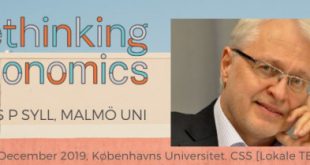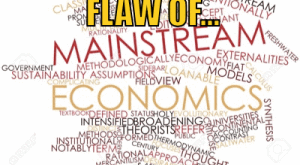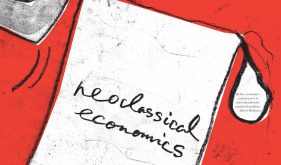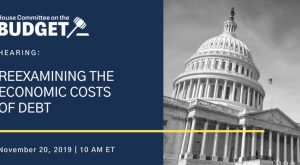The other day, on the way home after having attended an economics conference, yours truly tried to beguile the way by listening to a podcast of EconTalk where Garett Jones of George Mason University talked with EconTalk host Russ Roberts about the ideas of Irving Fisher on debt and deflation. Jones’s thoughts on Fisher were thought-provoking and interesting, but in the middle of the discussion Roberts started to ask questions on the relation between Fisher’s ideas and those of...
Read More »Rethinking economics in Copenhagen
Rethinking economics in Copenhagen
Read More »Maurice Allais on empirics and theory
Maurice Allais on empirics and theory Submission to observed or experimental data is the golden rule which dominates any scientific discipline. Any theory whatever, if it is not verified by empirical evidence, has no scientific value and should be rejected. Maurice Allais Formalistic deductive “Glasperlenspiel” can be very impressive and seductive. But in the realm of science, it ought to be considered of little or no value to simply make claims about the...
Read More »What is (wrong with) mainstream economics?
What is (wrong with) mainstream economics? If you want to know what is neoclassical economics — or mainstream economics as we call it nowadays — and turn to Wikipedia you are told that neoclassical economics is a term variously used for approaches to economics focusing on the determination of prices, outputs, and income distributions in markets through supply and demand, often mediated through a hypothesized maximization of utility by income-constrained...
Read More »IPA’s weekly links
Photo: Larry George II on UnsplashGuest post by Jeff Mosenkis of Innovations for Poverty Action For your travels this weekend I’ve put up some favorite podcast recommendations, plus some bonus reading, and kids’ podcasts. (Though they’re all potentially kids’ podcasts, in that when my kids misbehave in the back seat I threaten to put on an econ podcast and they shape up pretty quick.)The Nathan Nunn article on rethinking economic development was very readable. He argues that instead of...
Read More »Macroeconomic uncertainty
The financial crisis of 2007-08 hit most laymen and economists with surprise. What was it that went wrong with our macroeconomic models, since they obviously did not foresee the collapse or even make it conceivable? There are many who have ventured to answer this question. And they have come up with a variety of answers, ranging from the exaggerated mathematization of economics to irrational and corrupt politicians. But the root of our problem goes much deeper. It ultimately...
Read More »Randomised controlled trials — a retreat from the bigger questions
Randomised controlled trials — a retreat from the bigger questions Nobel prizes are usually given in recognition of ideas that are already more or less guaranteed a legacy. But occasionally they prompt as much debate as admiration. This year’s economics award, given to Abhijit Banerjee, Esther Duflo and Michael Kremer … recognised the laureates’ efforts to use randomised controlled trials (RCTs) to answer social-science questions … RCT evangelists sometimes...
Read More »Economics — enslaved by the wrong theory
Economics — enslaved by the wrong theory The more I learned about economics, the more I discovered a landscape that is surpassingly strange. Like the land of Mordor, it is dominated by a single theoretical edifice that arose like a volcano early in the 20th century and still dominates the landscape. The edifice is based upon a conception of human nature that is profoundly false, defying the dictates of common sense, before we even get to the more refined...
Read More »The Rhetoric of Deirdre McCloskey’s Rhetoric
This is not new to most of you of course. You are already steeped in McCloskey’s Rhetoric. Or you ought to be. After all economists are simply telling stories about the economy. Sometimes we are taken in. Sometimes we are not. Unfortunately McCloskey herself gets a little too caught up in her stories. As in her explanation as to how she can be both a feminist and a free market economist: “The market is the great liberator of women; it has not been the state, which is after all...
Read More »Reexamining the economic costs of debt
Reexamining the economic costs of debt In recent months a new approach to national government budgets, deficits, and debts—Modern Money Theory (MMT)—has been the subject of discussion and controversy. A great deal of misunderstanding of its main tenets has led to declarations by many policymakers (including Federal Reserve Chairman Jerome Powell and Japan’s Prime Minister Shinzō Abe) that it is crazy and even dangerous. Supposedly, it calls on central banks...
Read More » Heterodox
Heterodox










